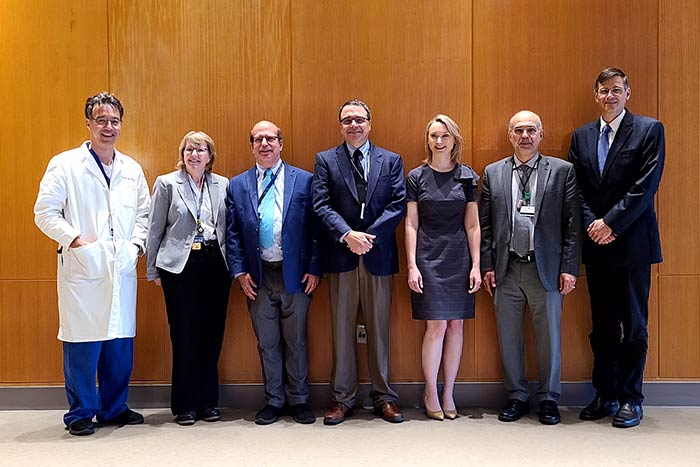The Johns Hopkins Pituitary Center specializes in diagnosis and treatment of people who have pituitary tumors and other pituitary disorders. Our multi-specialty team offers a full range of treatments, including observation, drug therapies, radiation and surgery. We create comprehensive treatment plans tailored for each patient, considering age, health status and other factors. We are also testing new medications and work on discovering genetic risk factors for pituitary tumors.
Conditions We Treat
- Hypopituitarism (insufficient hormones)
- Excess hormones
- Pituitary tumors and other masses:
- Prolactinomas
- Adenomas
- Craniopharyngiomas
- Rathke Cleft Cyst
- Other pituitary disorders
Clinical Trials
The Pituitary Center is actively recruiting participants for the following studies. If interested, contact the study coordinator at 410-502-0033 or Roberto Salvatori, M.D., principal Investigator, at 410-955-3921 or [email protected].
-
Principle Investigator: Roberto Salvatori, MD
Objective: This is a study to determine if the research drug, relacorilant, is safe and effective for people with Cushing's syndrome.
Eligibility Criteria: People with Cushing's Syndrome (Cushing's Disease).
More information on clinicaltrials.gov: NCT03697109 -
Principle Investigator: Roberto Salvatori, MD
Objective: This is a study to determine if the research drug, paltusotine, is safe and effective in controlling growth hormone (GH) levels in people with acromegaly.
Eligibility Criteria: People 18 years or older with acromegaly who are currently receiving and have responded to injections of octreotide or lanreotide as treatment.
More information on clinicaltrials.gov: NCT04837040 -
Principle Investigator: Roberto Salvatori, MD
Objective: This is a study to survey the treatment of acromegaly through electronic data collection.
Eligibility Criteria: Patients with acromegaly.
Appointments and Referrals
To arrange evaluations and request appointments, patients or their physicians can call 410-955-9270 to speak with an agent who can begin the scheduling process.
-
To better assess how to help you, a scheduling agent may ask you to send the following information. You or your physician can fax it to 410-630-7504:
- Relevant laboratory test results
- MRI reports (please do not send original films)
- Referring physician and clinic notes
- Copy of insurance card, front and back
It also helps to contact your insurance company to verify your coverage. Once we receive and review all completed forms and records, we will contact you to coordinate appointment(s) and arrange for forwarding any original films if necessary.
-
Please bring the following to your first appointment:
- All recent MRI scans relevant to your condition (actual images are preferred over CDs)
- Recent laboratory/blood reports
- Completed new patient questionnaire
Please arrive 15 minutes before your appointment. Feel free bring a book or snack so that you are comfortable before and between appointments with various physicians.
-
To follow up on your referral or provide additional information, physicians can call 410-955-4526.
The Pituitary Tumor Center staff will review the patient’s records and schedule appointments within approximately five business days.




